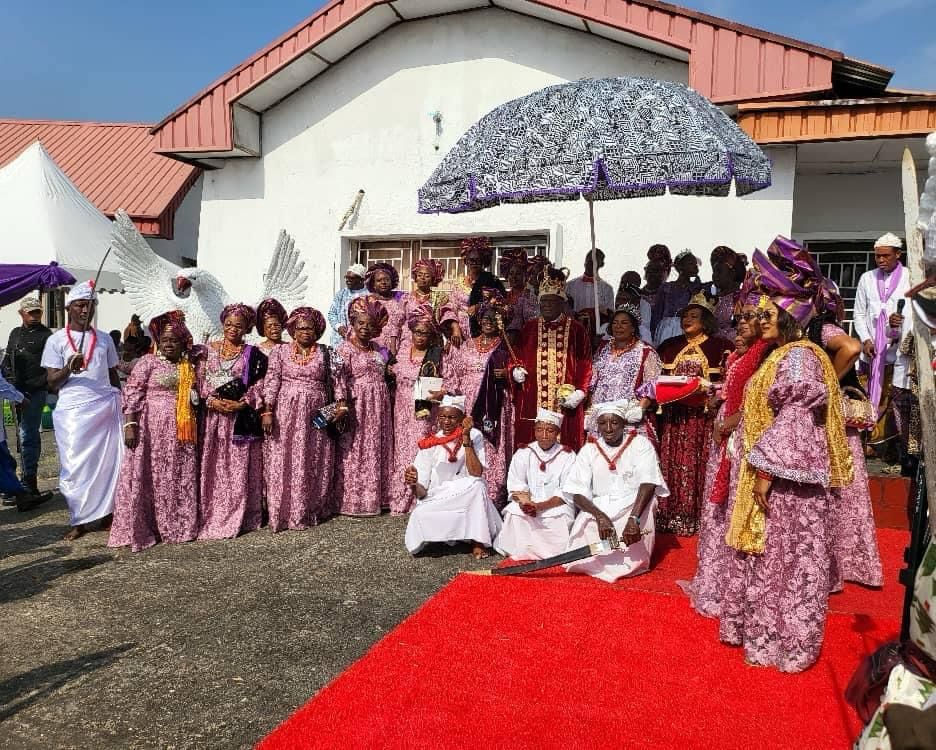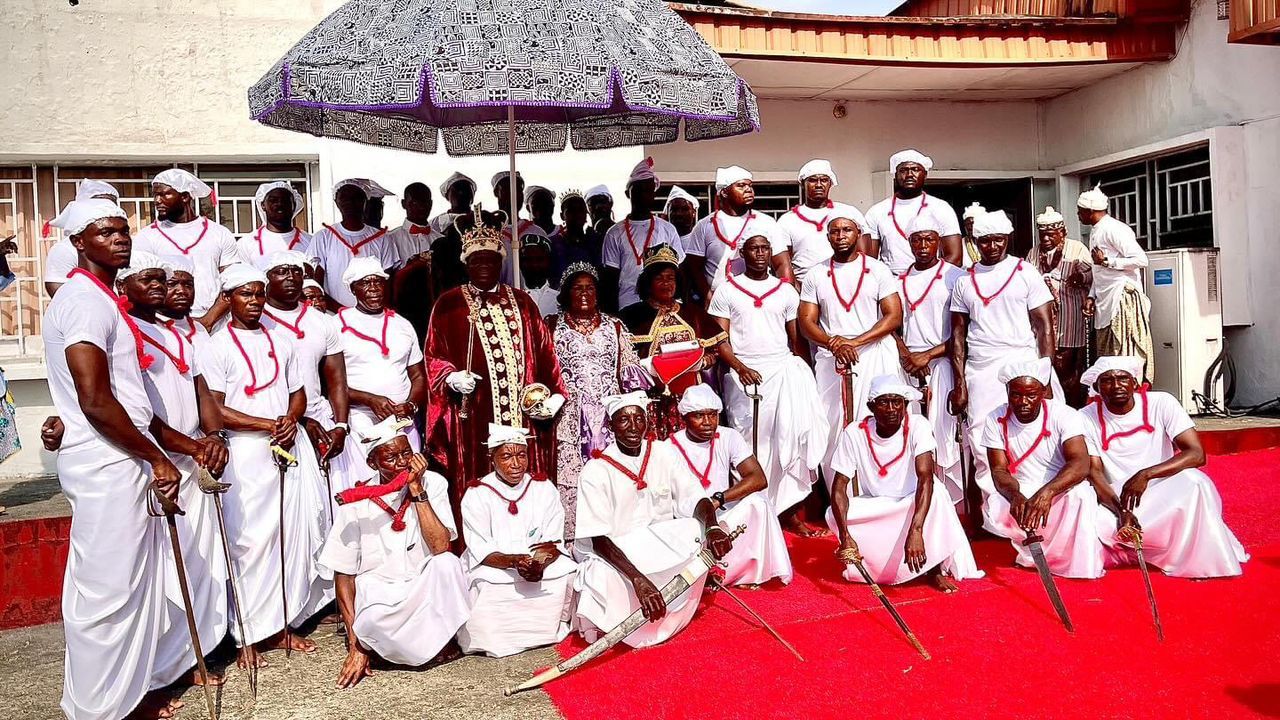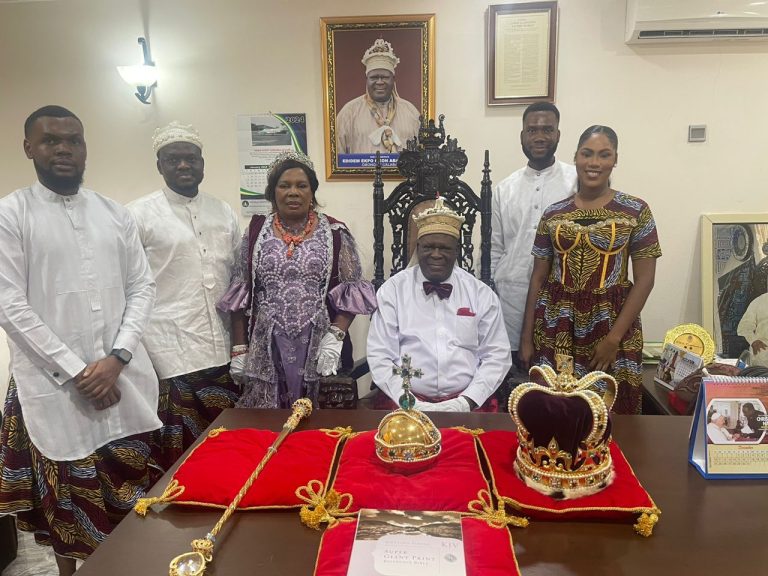The Obong of Calabar, His Eminence Edidem Ekpo Okon Abasi Otu. V is Natural Ruler, a Treaty King, and Grand patriarch of the Efik kingdom.
BIRTH, PARENTAGE AND PEDIGREE
On the morning of Sunday (Akwa Eyibio), 20th November, 1949, a boy child, delivered by late Madam Ikwo Okokon Ansa of Adiabo Esine Ufot, was born through the loins of Prince Okon Abasi Otu Ukpong Otu of Adiabo Ikot Mbo Otu, Guinea Company Town, Calabar. It is frequently reminisced in eulogies that the infant made no sound at birth until he was presented to his father who was enjoying himself in the sanctum of Otu Meseme Ekpe Lodge (Efe Ekpe Otu Meseme) at the time of his delivery.
The baby let out a loud thrilling cry as his bearers set foot in the lodge and as his father made salutations to “Ekpe“. His cry was considered an indication of his readiness and approval for initiation into the esoteric of Ekpe Efik Iboku on the very day of his birth.
For this reason, the “Nyamkpe Ekpe” of his fathers sings in his honour that Ekpo Okon akamana k’usen nkpo mfon, edia mfon emana”. The young lad was named according to custom on Monday (Akwa Eyibio), 28th November, 1949 after the rigors of circumcision.
He was given the genealogical name Ekpo Okon Abasi Otu Ukpong Otu Ukpong Mbo Otu Meseme Ukpong Ukpong Atai Ema Atai Iboku, which made him the 16th generation from the founding ancestors of the Efik Kingdom since the late 12th century AD.

The monarch hails from Adiabo ancestral clan; one of the seven nuclear clans (Esien Efik Itiaba) of the larger twelve ancestral clans of the Efik Kingdom. Although Adiabo clan is reputed to have been founded by Etinyin Ukpong Ukpong Atai Ema Atai Iboku, the real potentate of Adiabo is reminisced by Efik traditional talking drum (Obodom) as Otu Meseme (Otu Meseme referring to Otu Efa Ukpong Ukpong Atai Ema Atai Iboku).
This legendary ancestor of the Adiabo people is reputed to be the foremost accomplished swordsman/warlord in Efik history whose dexterity in the sword earned him invitation to side with the Falasha component (black Jews) of Ghana during the Fante-Ashanti warring days. It was Etinyin Otu Meseme Ukpong Ukpong Atai who designed the Efik Traditional Crown “Ntinya” at Edik Anyanya which has been coveted and adopted as traditional crown by all other ethnic groups, big or small, in Cross River and Akwa Ibom States.
Therefore the Efik people say and I proudly agree that ‘Efik enyene s’ino eyipde. It is therefore neither surprising nor out of place for a descendant of the designer of this Efik Ntinya to now don it. His Eminence, the Obong of Calabar, takes his pedigree from the last son of Otu Meseme; Prince Mbo Otu Meseme; founder of the 16th-century Ikot Mbo/lot Otu Ibuot/Atabong sub-groups of Adiabo.
His immediate father, His Royal Highness, the late Etubom Okon Abasi Otu was born in 1875 during the period of many significant princely personalities in the Efik kingdom but fought his way through to fame.
His key contemporary princes and friends of the period were PrinceOkpo Itam Antigha Itam Okpo of Otung, Creek Town (1870-1956), Prince Ekpenyong Eyo Ating Esu (alias Ekpenyong Ekpenyong Odusu) of Ikot Esu-Enwang (1871- 1950), Prince Ededem Asibong Ekpo Efiom of Archibong House (1872-1961), Prince Ekpenyong Okon Asibong Eso of Itak Mkpa Obutong (1873-1950) and Prince Abasi Orok Ededem Ekpo Efiom of Duke Town (1878-1921). Banded together, these six princes staged cultural displays and took up hunting expeditions at “Uduono-okpo Enwang” where Hope Waddell Training Institution is located today.
Prince Okon Abasi Otu rose to the position of an Etubom in Adiabo Ikot Mbo House and later as the Etinyin of the entire Adiabo clan thereby qualifying his son, this respected monarch, as a member of Efik Royal fraternity which formally came into existence in 1950. He was a significant trade merchant during the palm oil trade and an accomplished swordsman and warrior.
He, together with his friend and cousin, the late Ekpenyong Ekpenyong Odusu, with a small Efik military party planned and successfully executed the Efik-Ododop war at Uwet in 1917. With the passing on to glory of four of his contemporary princes and friends namely, Bassey Duke in 1921, Ekpenyong Eyo Mettinon and Ekpenyong Hogan Archibong in 1950, and Okpo Itam Antigha in 1956, Etubom Okon Abasi Otu Ukpong Otu was left as the only friend, confidant and dependable ally of Prince Ededem Archibong who ascended to Efik Throne as Archibong Vin January, 1950.
His Eminence, was born second son of a late marriage of his parents. His eldest sister, Abia Okon Abasi, was the only surviving child from the first witch-hunt on the royal stock of Ikot Mbo Otu. His father afterwards married a princess from the lineage of Etinyin Oku Ukpong Eton Ani Eton Ukpong Atai Ema Atai Iboku of Mbiabo Ikot Ofiong.

Although that marriage was blessed with as many as six children, none lived past their teenage years owing to the intense royal rivalry in Adiabo Ikot Mbo of those days. The rivalry had earlier seen the fleeing of Prince Antai Ema Etong Otu Ukpong Mbo Otu Meseme and his consequent establishment of the Atabong sub-group of Adiabo at Okobo, Akwa Ibom State.
Already a septuagenarian and all hopes seeming to have been lost, the Adiabo chieftain re-married to a young beautiful damsel; the delectable Ikwo Okokon Ansa, who gave birth to five children in quick succession. The children were: Okon Okon (Okokon), Ekpo Okon, Asuquo Okon, Asa Okon and Nyong (Isuk-ise) Okon.
To forestall a fresh witch-hunt on his young family, Obong Okon Abasi Ebak, as our monarch’s father was fondly called, promptly dispatched young Ekpo Okon to his maternal grand-aunt; a revered woman of note with good pedigree. Other children were similarly treated. Our young Prince Ekpo Okon was nurtured and bred for the task he would eventually take up: he was raised strong, bold and fearless. Little wonder why His Eminence is so clued up about lots of facts of historical concerns. His father, Obong Okon Abasi Otu passed on in 1965; a nonagenarian, frail but confident and understandably satisfied.
EDUCATION AND TRAINING
The young Prince Ekpo Okon attended St. Patrick’s Convent School Adiabo and later, St. Mary’s Primary School, Adiabo Esine Ufot, where he obtained his First School Leaving Certificate in 1963. In 1968, he obtained the West African School Certificate from the historic West African Peoples Institute (WAPI), Calabar, where he had his secondary education.
He was later trained at the Telecommunications School, Oshodi, Lagos, where he excelled, obtaining a diploma certificate in Telecommunications Engineering in 1973. His exceptional performance in training earned him employment in the school after graduation; an uncommon feat among his peers. The young Prince also obtained the City and Guilds Certificate in Telecommunications Engineering and the full technological Certificate of that institute in 1973 and 1976 respectively.
Later on, he obtained a Bachelor of Engineering degree in Electrical and Electronics Engineering from the University of Benin in 1998. In addition, he attended various professional and administrative courses including Domestic Satellite Communication in Houston, Texas, USA, Digital/Transmission System in Sweden and Norway, and finally a higher Administrative Management course in Lagos.
WORKING CAREER
The young Prince was employed as an Assistant Technical Officer-in-Training by the then Post and Telecommunications (P&T) Department of the Federal Ministry of Communications. On account of his proficiency, he became one of the outstanding trainee officers of that establishment at that time.
He grew on the job to become the Operations and Maintenance Manager in the Domestic Satellite Division of P&T and discharged his responsibilities with diligence, dedication and dexterity. Following the deregulation of the telecommunications sector of the Nigerian economy, His Eminence took his exit of the public sector and gained employment with Telnet Nigeria. Limited; a private sector firm whose main client was Shell Petroleum Development Company.
Proficiency continued to dot his career and he soon came to be noticed by McNair Nigeria Limited, which gave him an enhanced offer as her Divisional Manager (West). As a supervisor in the establishment, he superintended the Telecommunications network in the Western Division of the Company. He held the position until he heeded the call of his community to return home to take up the mantle of traditional rulership as Etubom of his ruling house.
FAMILY AND SOCIAL LIFE
Our Monarch is happily married to Princess Ansa (Veronica) Ekpo Okon Abasi Otu nee Edet Ukpong Okon Otu Ekpenyong Efa of Adiabo Akani Obio. The marriage is blessed with seven children namely; Arit, Abia, Ukpa, Ekpo, Otu, Asa, and Ukpong. In spite of his busy engagements, the Obong of Calabar finds time to attend to extended family commitments, sharing in the circumstances of his relatives and caring to the best of his ability. He is a lover of people, events and places. Little wonder that he came to international notice when he was decorated as Ambassador for Peace by the Federation of World Peace. His Eminence is a member of the Lagos Lawn Tennis Club and Patron of the Lagos Island Club. He loves reading and watching football matches.
CHRISTIAN LIFE
From childhood, the monarch had been a devout Christian of the catholic faith. At various times he was Vice-President of St. Patrick’s Station and member of the Finance Council of St. Mary’s Parish, Adiabo. He is currently Patron of many Associations in the Catholic Church. His commitment to Catholic life and defense of catholic principles culminated in his investiture as a Knight of the Order of Saint Mulumba (KSM).
He thus becomes not only the first Efik Catholic King but also the first Efik Catholic Knight to be Obong of Calabar!
JOURNEY TO THE THRONE
It is often rumored in many circles that the journey to the Efik Throne begins when an Efik male is made a chief by his family and community. But this is not true! Ete Ekpo’s journey to the throne began when he was brought into this world by a father who rose to the position of an Etubom of a house stated in the constitution of Efik Royal Fraternity of 1950.
The chieftaincy title received by royal males is merely honorary and does not qualify anyone to become an Etubom and certainly not an Edidem. Prince Ekpo Okon Abasi Otu became head of Ukpong Otu Ukpong Mbo Otu family and subsequently the Village Head of Adiabo Ikot Mbo Otu in 1999.
In 2003, he was made Clan Head and Etubom ufok Adiabo Ikot Mbo Otu and was inducted and capped by the then Obong of Calabar, His Eminence, Edidem (Prof.) Nta Elijah Henshaw VI, as Etubom Obio in 2004. The Efik monarch traversed various Ekpe titles from Murua Nkanda to Obong Okuakama and to Iyamba Ekpe (President) of Efe Ekpe Otu Meseme of Adiabo.
Following the demise of the immediate past Obong, His Eminence, the late Edidem (Prof.) Nta Elijah Henshaw VI on 16th February, 2008, a suitable successor was found in Etubom Ekpo Okon Abasi Otu from the Western Calabar geographical bloc of the Efik Kingdom, who was traditionally crowned at Efe Asabo (shrine of the python) on 3rd May, 2008.
He was thenceforth known and addressed as His Eminence, Edidem Ekpo Okon Abasi Otu V, Obong of Calabar; Natural Ruler, Treaty King, Defender of the Christian Faith and Grand Patriarch of the Efik Kingdom.
On 11th July, 2008, His Eminence was officially recognized by the Government of Cross River State when he was presented with a staff of office as Obong of Calabar, in an impressive public ceremony at the State Cultural Centre Complex, Calabar by the then State Governor, Senator Liyel Imoke.
Finally, the charismatic Monarch was presented before God in keeping with the tradition of Church Coronation at the Presbyterian Church of Nigeria, Duke Town Parish in December, 2008. This aspect of Efik’s kingship activity was suggested and orchestrated by the late Queen Victoria of Great Britain in 1878.
His Eminence was crowned by the late legendary Pastor Eyo Edet Okon of The Apostolic Church of Nigeria and admitted into the Comity of World Christian Kings as Defender of the Christian Faith and 79th recognized Monarch of the Efik Kingdom.
HIS ATTRIBUTES
The Efik Monarch is a man of intrepid capabilities whose character is laced with a very significant measure of honesty, warmth and compassion. His concern for the plight of the less-privileged, whom he spares no effort to assist, has endeared him to many. He is a transparently humble and pleasant personality; a personification of modesty and courage, even under extremely challenging situations. He is an absolute charmer, in looks and in character, evidently charismatic, especially with his towering features, amiable royal posture and gentle character.
This most celebrated Monarch is accessible, sociable, welcoming and very forgiving. He operates on the principle of fair-hearing, second chances and inclusive leadership. Certainly not for him, the subtle arrogance, vanity and royal exclusiveness that distance some Kings from their subjects.
His knowledge of royal historical events and the people who caused them is amazing. Certainly, Efik Kingdom has not had it this good in a very long while. His Eminence is a true example of proper upbringing and royal tutelage in things that really matter. He is a royalty that comes naturally in simple, humble, self-effacing and quiet mien that radiates peace and love towards his people.
AWARDS AND ACHIEVEMENTS
His Eminence bagged the International Telecommunication Union best student award; the conferment of which was made by the late Nigerian Military Head of State; General Murtala Muhammed who was then Minister of Communications (date).
Quite significantly, the reign of His Eminence has witnessed such landmark achievements as:
• The re-instatement of the Efik language as a subject in the Senior Secondary School
Certificate examinations by the West African Examinations Council (WAEC).
• The full integration/unification of the original twelve principalities or ancestral clans of the Efik Kingdom.
• The establishment of the Obong of Calabar Executive Forum as an advisory and executive arm of government of the Efik Kingdom which is open to all professional Efik sons and daughters.
• The institution of scholarships for Efik students in tertiary institutions irrespective of degree programmes.
• The development of sustainable charity projects in the communities that make up the Efik Kingdom.
• His installation as Chancellor of the Federal University of Agriculture, Abeokuta; a feat that eluded three monarchs before him.

